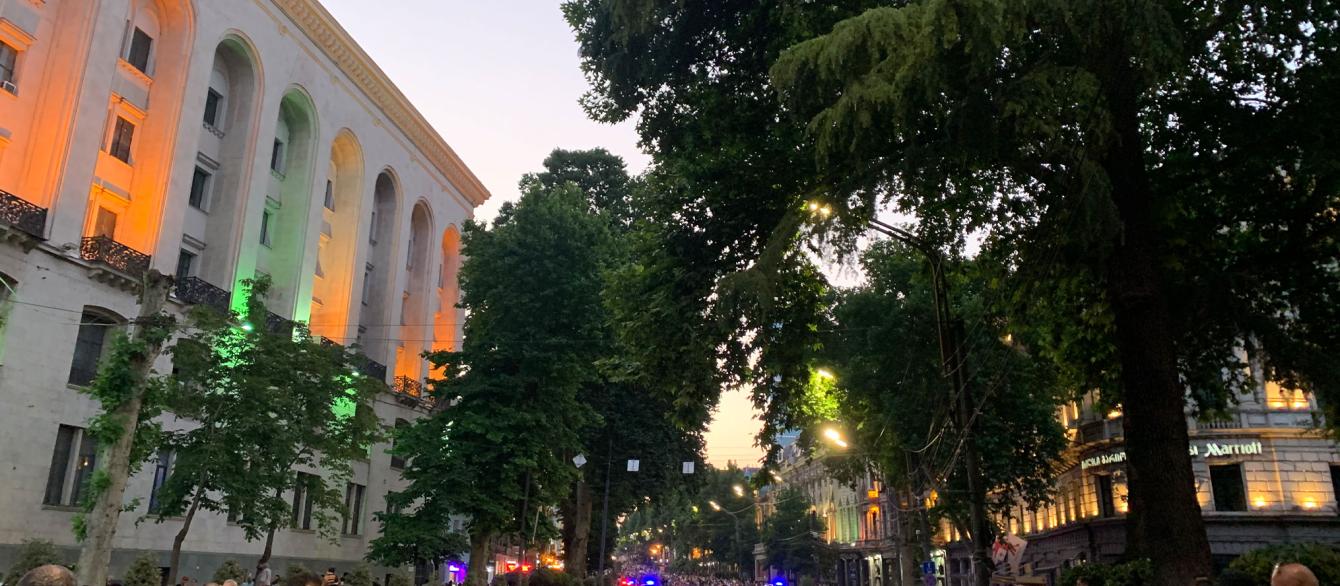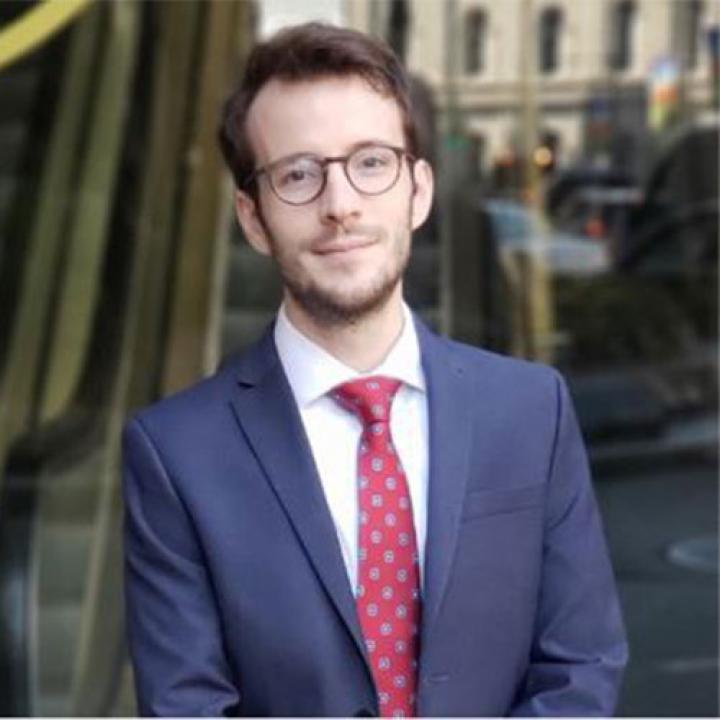Civil society organizations in Georgia face a conundrum. In July, the EU Commission announced its decision on Ukraine, Moldova, and Georgia’s joint application to become formal candidates for EU membership. Unlike Ukraine and Moldova, which were granted immediate candidate status, the EU Commission opted to merely provide Georgia “European perspective.” In practice, this means that the Commission will recommend that Georgia be granted formal candidature only after it fulfills 12 conditions.
The imposed conditions range widely in scope. Fulfilling all of them would, among other things, require Georgian policymakers to bring about sweeping reforms to the judicial system and take concrete steps to address deep-seated polarization and reduce oligarchic influence over the country’s politics. The EU Commission is expected to provide an assessment of the progress that Georgia has made towards fulfilling the 12 conditions in October 2023.
The EU Commission’s decision reverberated loudly in Georgia, where about 85% of people support continued Euro-Atlantic integration. There were demands for the resignation of the Georgian Dream government, whose anti-democratic machinations and fealty to the party’s founder, oligarch Bidzina Ivanishvili, are chiefly responsible for Georgia’s stalled progress toward EU membership. The Shame Movement and various civil society organizations called for the installation of a technical government that would be charged with fulfilling the EU Commission’s conditions. A mass demonstration in support of the proposed technical government drew tens of thousands, yet failed to bring about a change in the country’s leadership (or even briefly temper active democratic backsliding).
Achieving greater westward integration has long reflected the will of the Georgian people.
The stakes are high. Attaining candidate status in and of itself would be an important step forward for the country, a legitimation in Brussels of the Georgian people’s westward orientation. Candidate status may also help ease domestic political polarization, which has recently been exacerbated by heated accusations over who bears the most responsibility for the EU Commission’s recent decision. More obviously, becoming an EU member state in the coming decades would bring about huge gains to GDP, increase wages and living standards for everyday Georgians, and more closely involve European nations in the country’s precarious security environment.
In the wake of the ineffective demonstrations in support of the technical government, the question of how (a largely unified) Georgian civil society can meaningfully enhance the country’s candidate status prospects remains urgent and unresolved. This question should be the top priority for every Georgian organization concerned with democratic reform and good governance until October 2023.
There is reason for optimism, despite the Georgian Dream’s apparent lack of interest in working collaboratively to fulfill the EU Commission’s conditions. For starters, the EU Commission’s decision to grant formal candidate status constitutes nothing more than a signaling mechanism. It is a purely symbolic gesture (albeit a crucial one for Georgia); it provides no guarantee of eventual accession to the bloc. Turkey, for instance, has held candidate status since 1999 and though its accession negotiations began in 2005, Turkey’s membership prospects remain dim. Amid the Russian invasion of Ukraine, EU officials will be loath to not eventually grant Georgia candidate status, regardless of the country’s progress on the 12 imposed conditions. Failing to do so – or rejecting Georgia’s candidature bid outright – would provide Vladimir Putin with a tremendous symbolic victory, a tacit admission that Russia can dictate European affairs through sheer force and intimidation.
However, the EU Commission will be unlikely to grant candidate status without some level of progress on the Georgian side. And its patience will not be unlimited. What is required is a perception among EU officials that Georgian politicians and key civil society actors are working together, with at least some level of good faith, and that they are making general progress on some of the 12 conditions. After all, Moldova and Ukraine have not exactly made consistent or significant advances toward achieving European democratic and political standards in recent years. Yet both countries were awarded candidature due to a perception of reasonable progress among EU Commission administrators (admittedly, in the Ukrainian case, the Commission’s decision to grant candidature was also a display of solidarity amid the Russian invasion).
Rejecting Georgia’s candidature bid outright would provide Vladimir Putin with a tremendous symbolic victory, a tacit admission that Russia can dictate European affairs through sheer force and intimidation.
High-profile civil society organizations in Georgia must therefore temporarily forego their reservations about the Georgian Dream’s autocratic tendencies and participate ardently in the ruling party’s proposed working groups on the EU Commission’s conditions. Some organizations are concerned that joining the working groups could jeopardize their hard-earned reputation as independent actors. Worse still, their participation in the working groups could constitute a win for the Georgian Dream, providing a sheen of legitimacy to a process that in all likelihood will (even with the involvement of civil society) only produce half-baked, insufficient recommendations about how to fulfill the EU Commission’s 12 conditions.
However, if CSOs refuse to participate in the government’s working groups – or if they participate exclusively in opposition parties’ parallel working process –Georgia’s EU candidature prospects will be all but doomed. At the end of the day, the Georgian Dream-led groups are the only real forum to recommend and affect potential reforms, so Georgian civil society must maintain a seat at the table throughout the entire process. Their refusal would signal to the EU Commission that Georgian politics remain paralyzed, mired in polarization. And it would ensure that the working groups’ eventual recommendations involve no input from civil society actors, reflecting only the Georgian Dream’s interests.
Given that Georgian Dream politicians felt enough public pressure to establish working groups in the first place, they may well also recognize that their working groups must have the appearance of legitimacy that only independent organizations’ involvement can provide. In turn, this could mean that civil society organizations may wield sufficient leverage in working group negotiations to get some limited number of effective reforms included in the groups’ recommendations (like, say, alterations to the structure or operations of Georgia’s High Council of Justice, a key barrier to greater judicial independence in Georgia).
If CSOs refuse to participate in the government’s working groups – or if they participate exclusively in opposition parties’ parallel working process –Georgia’s EU candidature prospects will be all but doomed.
Achieving greater westward integration has long reflected the will of the Georgian people. The current prospect of EU candidate status is a once-in-a-generation opportunity for the country that would mark a crucial step toward this goal. Georgian civil society organizations must therefore set aside their differences and do everything in their power to put the country in the strongest possible position for EU candidature by October 2023. This does not mean that civil society organizations must shed their democratic principles or belief in governance based on the rule of law. It does, however, mean that they should commit to robust, lengthy, potentially symbolic negotiations in the framework of the Georgian Dream’s working groups, and remain open to compromises that are far from ideal.
This piece originally appeared in Georgian Young Lawyers Association (GYLA) on September 9, 2022.






